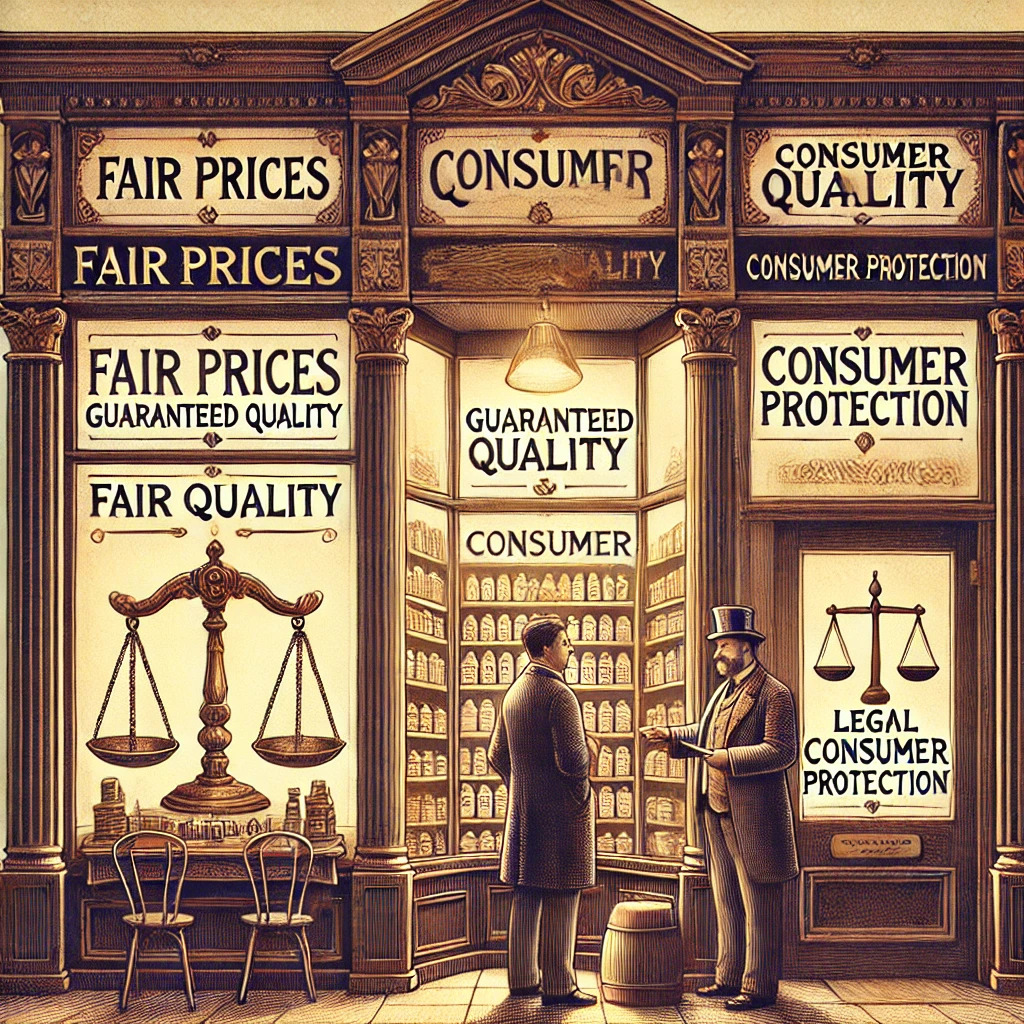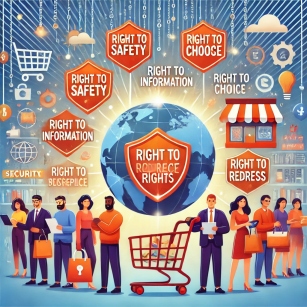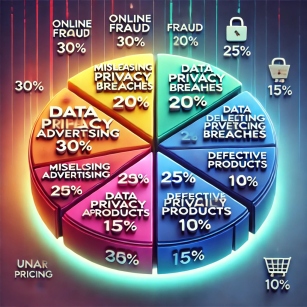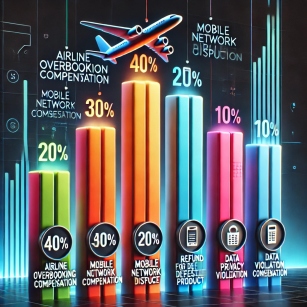Know Your Rights: Empowering Consumers in the Digital Age
 Aalisha Nishath
Aalisha NishathTable of contents

Introduction
Every year, March 15th is celebrated as World Consumer Rights Day to raise awareness about the rights and responsibilities of consumers. In today’s digital world, where online shopping, digital payments, and data privacy concerns are on the rise, knowing your consumer rights is more important than ever.
Consumer rights are the foundation of a fair and transparent marketplace, ensuring that individuals receive quality goods and services while being protected from exploitation. These rights empower consumers to make informed decisions, seek justice in case of malpractice, and hold businesses accountable for unethical practices. With global commerce expanding and digital transactions becoming the norm, it is crucial to educate individuals on their rights to ensure they do not fall victim to fraud, misinformation, or substandard products.
Governments and regulatory bodies worldwide continue to enforce and update consumer protection laws to adapt to the evolving landscape of commerce and technology. However, consumer awareness plays a vital role in ensuring that these rights are effectively upheld. By staying informed and proactive, consumers can contribute to a more ethical and consumer-friendly marketplace.
Understanding Consumer Rights
Consumer rights ensure that buyers are protected from fraud, defective products, and unethical business practices. The key consumer rights include:

Right to Safety – Protection from hazardous products and services.
Right to Information – Access to accurate details about goods and services.
Right to Choose – Freedom to select from a variety of products.
Right to be Heard – Consumers can voice complaints and receive fair resolution.
Right to Redressal – Compensation for defective goods or poor services.
Right to Consumer Education – Awareness programs to educate consumers about their rights.
Right to a Healthy Environment – Assurance of products that do not harm the environment or public health.
Consumer Rights in the Digital Era
With the rise of e-commerce and online transactions, consumers face new challenges like cyber fraud, misleading advertisements, and data breaches. Here are some critical rights consumers should be aware of:
Right to Data Privacy – Companies must protect consumer data and ensure transparency in data usage.
Right Against False Advertising – Misleading claims or hidden charges should be reported.
Right to Fair Pricing – Online platforms must follow fair pricing policies without deceptive practices.
Right to Secure Digital Transactions – Consumers have the right to encryption and secure payment methods to prevent fraud.
Emerging Consumer Rights Issues
As technology evolves, new consumer protection challenges have emerged. Some key areas of concern include:
1. AI-Driven Advertising and Manipulation
Artificial Intelligence (AI) is used to target consumers with highly personalized ads. While this improves user experience, it also raises concerns about:
Data Privacy: AI-driven ads rely on tracking user behavior, sometimes without clear consent.
Manipulative Marketing: AI algorithms can push consumers toward specific choices, limiting fair competition.
Deepfake Advertisements: The rise of AI-generated content makes it harder to differentiate real from fake promotions.
2. Cryptocurrency Scams and Digital Fraud
The increasing adoption of cryptocurrencies has led to a rise in fraudulent schemes, such as:
Ponzi Schemes & Fake Investments: Many consumers fall victim to fake crypto trading platforms promising high returns.
Lack of Regulation: Unlike traditional banking, crypto transactions are largely unregulated, making fraud recovery difficult.
Hacking & Wallet Thefts: Consumers must ensure they use secure platforms and enable multi-factor authentication for digital wallets.
3. Influencer Marketing Ethics
Influencers play a huge role in modern advertising, but ethical concerns include:
Misleading Endorsements: Some influencers promote products without testing them, leading to false advertising.
Undisclosed Sponsorships: Many influencers fail to disclose paid partnerships, deceiving consumers.
Fake Reviews & Promotions: Influencer-driven promotions may exaggerate product benefits, leading to poor consumer decisions.
Regulations are now being introduced to ensure transparency in AI-based ads, cryptocurrency transactions, and influencer promotions.

Consumer Protection: Key Statistics
Consumer fraud and scams are increasing globally. Here are some recent statistics that highlight the importance of consumer rights:
Online Fraud: According to a 2023 report by the Federal Trade Commission (FTC), consumers in the U.S. lost over $10.3 billion to online fraud, an increase of 20% from the previous year.
E-Commerce Scams: A survey found that 67% of online shoppers have encountered misleading advertisements or counterfeit products.
Data Privacy Breaches: In 2024, there were over 5,000 reported data breaches worldwide, exposing the personal information of millions of users.
Fake Reviews: Studies suggest that 30% of product reviews on major e-commerce sites are fake, misleading consumers into making poor purchasing decisions.
These statistics emphasize the need for strong consumer protection laws and increased awareness among buyers.

Government Regulations on Consumer Rights
Governments and regulatory bodies worldwide have implemented various laws to protect consumer rights. Some of the most prominent regulations include:
Federal Trade Commission (FTC) - USA: Ensures fair trade practices, prevents deceptive advertising, and protects consumers from fraud.
Consumer Protection Act - India (2019): Strengthens consumer rights by addressing unfair trade practices, false advertising, and defective products.
General Data Protection Regulation (GDPR) - EU: Protects consumers' personal data and ensures transparency in data collection and usage.
Competition and Markets Authority (CMA) - UK: Regulates fair competition and protects consumers from misleading advertising and business malpractices.
Australian Consumer Law (ACL): Provides protection against false advertising, defective products, and unfair business practices.
These regulations aim to create a transparent and accountable marketplace where businesses operate ethically, and consumers have legal protection against exploitation.
Case Studies: Consumer Rights in Action
Case Study 1: Facebook-Cambridge Analytica Data Scandal (2018)
One of the biggest data privacy violations occurred when Cambridge Analytica harvested personal data from millions of Facebook users without their consent. This led to a global outcry, strict regulatory actions, and improved data privacy laws like the General Data Protection Regulation (GDPR). It highlighted the importance of the Right to Data Privacy and consumer protection against data misuse.
Case Study 2: Johnson & Johnson Baby Powder Lawsuit (2020)
A group of consumers sued Johnson & Johnson, alleging that its talcum-based baby powder contained asbestos, leading to health hazards. The company was forced to pay billions in settlements, and the product was withdrawn from several markets. This case emphasizes the Right to Safety and the need for strict consumer protection laws.
Case Study 3: Amazon Fake Reviews Crackdown (2022)
Amazon took legal action against thousands of fraudulent reviewers and third-party sellers who manipulated product ratings. This move ensured that consumers could trust product reviews, reinforcing the Right to Information and ethical business practices in e-commerce.
Case Study 4: Volkswagen Emissions Scandal (2015)
Volkswagen was found guilty of installing software in diesel cars to manipulate emissions tests. The company had to recall millions of vehicles and pay huge fines. This case highlights the Right to Honest Advertising and the importance of corporate accountability.
Case Study 5: Apple’s “Batterygate” Controversy (2017)
Apple was accused of deliberately slowing down older iPhones without informing users, leading to consumer lawsuits. The company later issued battery replacements and provided software updates. This case underscores the Right to Information and the importance of corporate transparency.
Consumer Success Stories 🏆
Success Story 1: Airline Overbooking Compensation (2022)
A passenger, John Doe, was denied boarding due to airline overbooking. He filed a complaint under the Air Passenger Bill of Rights, which mandates compensation for such incidents. After legal intervention, he received $1,500 in compensation and a free future flight. This case highlights the Right to Redressal and the importance of knowing airline consumer protection laws.
Success Story 2: Mobile Network Billing Dispute (2023)
Sarah, a mobile network customer, noticed unauthorized charges on her bill. After contacting customer support multiple times with no resolution, she filed a complaint with the Telecom Regulatory Authority. Within weeks, the company was forced to refund the excess charges and issue an official apology. This case demonstrates the power of the Right to be Heard and the effectiveness of consumer advocacy.

Ways to Protect Consumer Rights
Consumers play an essential role in ensuring their rights are upheld. Here are some effective ways to protect consumer rights:
Stay Informed – Educate yourself about consumer rights and the laws that protect you. Follow reliable sources such as government websites and consumer advocacy groups.
Read Terms and Conditions – Always read the fine print before purchasing products, signing contracts, or agreeing to online terms.
Verify Sellers and Products – When shopping online, ensure the seller is reputable by checking reviews, ratings, and product authenticity.
Report Fraudulent Activities – If you encounter misleading advertisements, scams, or defective products, report them to consumer protection agencies.
Use Secure Payment Methods – Avoid direct bank transfers when purchasing online. Use credit cards or secure payment gateways to prevent fraud.
Be Cautious with Personal Data – Avoid sharing unnecessary personal information online to protect yourself from identity theft and data breaches.
Check Return and Refund Policies – Before making a purchase, ensure you understand the return and refund policies of the seller or platform.
Support Ethical Companies – Choose brands that value transparency, sustainability, and fair business practices.
Encourage Consumer Awareness – Share knowledge with others and participate in consumer rights campaigns and awareness programs.
Conclusion
Consumer rights empower individuals to make informed decisions and hold businesses accountable. As we celebrate World Consumer Rights Day 2025, let’s pledge to be aware, responsible, and proactive in protecting our rights. Whether online or offline, an informed consumer is a protected consumer!
For more insights:
Please share your valuable insights with us in the comments.
Subscribe to my newsletter
Read articles from Aalisha Nishath directly inside your inbox. Subscribe to the newsletter, and don't miss out.
Written by
